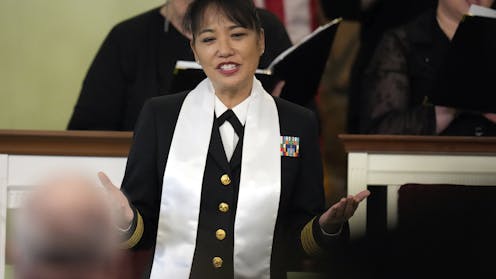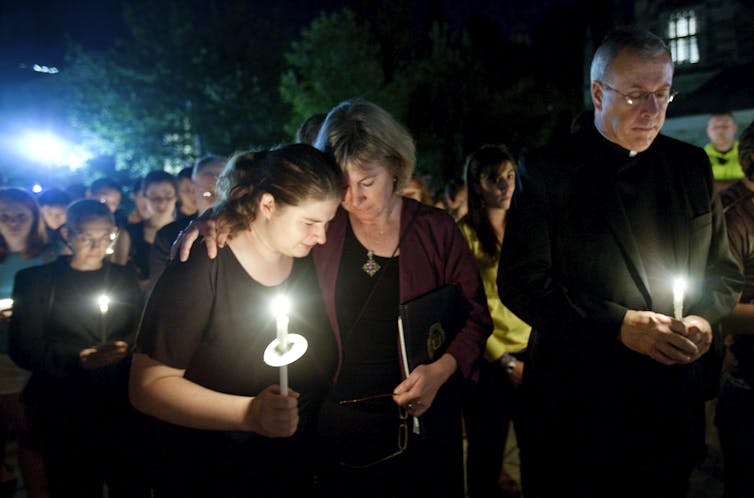Schools are looking for chaplains, but the understanding of who – and what – chaplains are varies wi
The term ‘chaplain’ does not have a legal definition in the US at the federal or state level.

There is an ongoing push to make chaplains available in public schools across the United States. Chaplains, also called spiritual caregivers, are religious professionals who work in secular institutions and can be of any tradition or none at all.
Indiana is currently considering a bill that would allow chaplains in public schools to provide “support services.” Florida passed a law in 2024 to allow school districts to bring in volunteer chaplains. Texas started to allow public school chaplains in 2023 – the first state to do so.
A poll conducted by the AP-NORC Center asked Americans in June 2025 if they would allow “religious chaplains providing support services for students” in public schools. More than half – 58% – said they would. What is meant by “support services” is unclear.
These debates raise issues about religion in schools and the separation of church and state. But as sociologists of religion studying chaplaincy for over 20 years, we know that most people in the U.S. have never met one and could have widely varying understanding of who chaplains are and the kinds of services they provide.
Have you met a chaplain?
In 2022, the Chaplaincy Innovation Lab, a think tank that we formed to bring chaplains, theological educators, clinical educators and social scientists into conversation about spiritual care, partnered with the Gallup organization to conduct the first national survey that asked Americans about their experience with chaplains. A nationally representative group of 1,096 people took the survey online.
Before we asked people about their experiences with chaplains, we worked with a panel of 28 leading experts in professional chaplaincy to agree on a shared definition: “Clergy or other religious guides or spiritual caregivers who serve people outside of churches or other houses of worship, in settings such as hospitals, the military, prisons, or institutions of higher education, to name a few examples.”
We found that about 18% of American adults – almost 1 in 5 – had interacted with a chaplain based on this definition. We further found that about 68% of those who had met a chaplain did so in health care settings such as hospitals, outpatient clinics and hospices.
Follow-up interviews with 50 of the survey respondents showed that people have a wide range of definitions of the term chaplain – they are rarely thinking the same things. Many people told us about congregational leaders, and almost as many told us about spiritual connections they share with their friends, families and people in their community.
The term chaplain does not have a legal definition in the U.S. at the federal or state level. As a result, anyone can call themselves a chaplain at any time and for any reason. People do not need to have a license, unlike medical professionals, hairdressers, heavy vehicle drivers and others, to call themselves a chaplain.
Training and certification
However, the training requirements for being employed as a chaplain can vary widely across sectors.
Health care organizations generally require that chaplains hold a graduate-level degree from an accredited seminary or divinity school, on-the-job training called clinical pastoral education, and in some cases board certification to demonstrate competency and professionalism.
Federal agencies such as the Department of Defense, the Department of Veterans Affairs and the Federal Bureau of Prisons are required to have chaplains to ensure that service members, veterans and incarcerated people can freely practice their religion.
The educational requirements at each federal agency differ from health care and from each other. Each federal agency outsources the religious training and certification to religious organizations called endorsing agencies or endorsers. To preserve the separation of church and state, it is these religious endorsing agencies, not the government, that decide whether a given person is qualified and prepared to be a chaplain.

Role of chaplains
Chaplains in health care work with patients, family members and caregivers; they also provide spiritual care to their fellow employees. Military chaplains have similar duties but also advocate for the rights of service members to freely practice their religion. College and university chaplains increasingly serve secular campuses by providing spiritual care to those who need it, as well as ethical guidance and volunteer service opportunities to all students.
Additionally, chaplains have worked with everyone from homeless people in Denver to protesters in Atlanta, urban cyclists in Boston and NASCAR drivers and fans – groups that can have very different spiritual needs.
As chaplains have frequently told us, every day is an improvisation.
Schools and chaplaincy
Several states are moving forward with adding chaplains to public schools, and to our knowledge none are focused on the education or training that other settings require of professional chaplains.
According to Indiana’s Senate Bill 523, a chaplain can be anyone with either a bachelor’s or master’s degree in “divinity, theology, religious studies or a related field” and two to four years of “counseling experience.”
Training in chaplaincy is not required, nor are counseling credentials. People who are hired as school counselors in Indiana must be licensed – but there is no such thing as a chaplaincy license.
Florida did not define chaplains when it passed House Bill 931 to bring in volunteer chaplains. No requirements for the chaplains were set, other than a background check.
What this means is that school chaplain positions would likely draw people without formal training. People who will work in schools might not be trained chaplains or professional chaplains – just people who call themselves a chaplain. And that, we believe, would be an extremely troubling trend.
Given the nuances of a chaplain’s role and qualifications, it’s hard to really assess what people want or mean when 58% of people say they support chaplains in public schools.
Wendy Cadge receives funding from the Templeton Religion Trust
Amy Lawton receives funding from the Templeton Religion Trust.
Read These Next
Crowdfunded generosity isn’t taxable – but IRS regulations haven’t kept up with the growth of mutual
Some Americans are discovering that monetary help they received from friends, neighbors or even strangers…
Picky eating starts in the womb – a nutritional neuroscientist explains how to expand your child’s p
While genes do influence some food preferences, positive experiences can help make new tastes easier…
How transparent policies can protect Florida school libraries amid efforts to ban books
Well-designed school library policies make space for community feedback while preserving intellectual…





